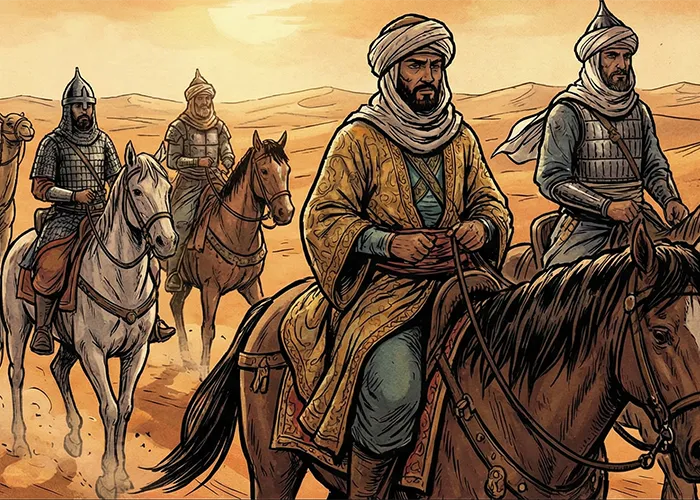Editorial – volume01 Issue21
Guided by Wisdom and Tolerance: Living the Teachings of the Quran and Lady Fatimah al-Zahra
In this issue of Friday Bulletin, we honor three significant occasions that highlight core Islamic values: devotion to faith, the pursuit of knowledge, and the practice of tolerance. First, we observe the days of Fatimiyyah, commemorating the martyrdom of Lady Fatimah al-Zahra (peace be upon her), a profound symbol of piety, strength, and dedication. Her life and legacy serve as an enduring example of humility, compassion, and unwavering commitment to justice, inspiring us to reflect deeply on our own character and aspirations.
Additionally, we commemorate the 24th of Aban, known as the Day of Commemoration of Ayatollah Allameh Seyyed Mohammad Hossein Tabataba’i. This day celebrates a luminary of Islamic thought whose works, particularly his Quranic exegesis Tafsir al-Mizan, continue to illuminate paths of spiritual and intellectual growth.
Finally, we observe November 16th as the International Day for Tolerance, a day that echoes the Quranic call for compassion and respect and the teachings of the Ahlul-Bayt on harmony and coexistence. Together, these observances highlight the importance of embracing both knowledge and kindness as the foundations of faith and as guiding principles for just, compassionate, and resilient communities.
This issue focuses on understanding and applying these timeless Quranic principles in our daily lives. As we delve into these values, we are reminded that the Quran and the wisdom of the Ahlul-Bayt offer a profound and enduring guide to building a world grounded in mercy, respect, and justice for all.
- The Days of Fatimiyyah: Embracing the Legacy of Lady Fatimah al-Zahra
In the coming days, we observe the anniversary of the martyrdom of Lady Fatimah al-Zahra (peace be upon her), according to one of the historical narrations. This commemoration, marking the beginning of the first Fatimiyyah period, is followed by the second Fatimiyyah, which is based on a more widely accepted date of her martyrdom. Across these two periods, Shi‘a communities worldwide reflect upon the life, virtues, and tribulations of Lady Fatimah. Her followers gather to honour her legacy, to recount her noble qualities, and to weep for her sufferings, seeking to bring their own lives closer to her exemplary character.
Lady Fatimah (peace be upon her) was a profound model of piety, humility, and resilience. The daughter of the Prophet Muhammad (peace be upon him and his family) and the mother of the Imams, she is revered as a symbol of virtue, wisdom, and compassion. Her life stands as an inspiration for those who seek closeness to Allah SWT and commitment to justice. Her selflessness, her steadfast defence of truth, and her tireless support of the message of Islam continue to illuminate the path for her followers. The love and reverence for Lady Fatimah among the Shi‘a are more than commemorative; they serve as a reminder to embody her virtues in every aspect of life, striving to live with the same commitment to faith and moral integrity.
These Fatimiyyah days offer a valuable opportunity for self-reflection, providing a time to connect more deeply with her teachings and example. To truly follow the Ahlul-Bayt, it is not enough to mourn their hardships; we must seek to incorporate their wisdom, patience, and dedication to Allah into our own lives. Lady Fatimah’s legacy calls upon us to strive for justice, to be compassionate towards others, and to uphold the values of humility and devotion in all that we do.
- Commemoration of Ayatollah Allameh Seyyed Mohammad Hossein Tabataba’i (24th of Aban)
In commemorating the life and legacy of Ayatollah Allameh Tabataba’i, we honour a scholar whose dedication to Quranic knowledge and Islamic philosophy has illuminated the path for generations seeking both intellectual and spiritual growth. A few points about his remarkable life are outlined here.
- Life and Legacy: Allameh Tabataba’i (1903–1981) was a renowned Islamic scholar and philosopher whose dedication to Islamic knowledge has left a lasting impact on the study of the Quran. His life reflects the Quranic call to continually seek wisdom:
“وَقُل رَّبِّ زِدْنِي عِلْمًا“
“And say, ‘My Lord, increase me in knowledge.’” (Quran 20:114)
This verse encapsulates the spirit of his lifelong pursuit of insight and understanding.
- Intellectual Contributions: Beyond his Quranic commentary, Allameh Tabataba’i’s contributions to Islamic philosophy and ethics helped bridge reason and revelation, showing that intellect and spirituality must coexist. The deeper Allameh Tabataba’i delved into the profound depths of Quranic verses and their interpretation, the greater his capacity for reflection on the divine words became. This aligns with Imam Ali’s saying:
کُلُّ وِعَاءٍ يَضِيقُ بِمَا جُعِلَ فِيهِ إِلاَّ وِعَاءَ الْعِلْمِ، فَإِنَّهُ يَتَّسِعُ بِهِ
“Every container narrows when filled, except for the vessel of knowledge, which only expands.” (Nahj al-Balagha, Wisdom 92)
His writings continue to guide both the scholarly and spiritual lives of those seeking a deeper connection to the Quran.
- Enduring Influence: Honouring Allameh Tabataba’i’s legacy reminds us that the Quran serves as a guide for all aspects of life. He encouraged not only study but also the embodiment of Quranic values such as humility, patience, and empathy. His approach reflects the words of Imam Ja’far al-Sadiq:
“مَن تَعَلَّمَ العلم لِلَّهِ وَعَمِلَ بِهِ وَعَلَّمَهُ لِلَّهِ دُعِيَ في مَلَكوتِ السَّمَواتِ عَظيما“
“Whoever learns knowledge for the sake of Allah, acts upon it, and teaches it to others for the sake of Allah, will be called in the heavens ‘great.’” (Al-Kafi, Vol. 1, 35)
- International Day for Tolerance (16th of November)
The International Day for Tolerance reminds us of the Quran’s call to patience, compassion, and respect for all humanity, values emphasised in the teachings of the Prophet Muhammad (PBUH) and Ahlul-Bayt (AS) as foundations for peaceful coexistence and unity. A few important notes about tolerance in the teaching of Islam are mentioned here.
- Tolerance in the Quran: Tolerance and kindness towards others are deeply rooted in the Quran. The Quran encourages believers to respond to negativity with goodness and forgiveness:
“وَلَا تَسْتَوِي الْحَسَنَةُ وَلَا السَّيِّئَةُ ادْفَعْ بِالَّتِي هِيَ أَحْسَنُ فَإِذَا الَّذِي بَيْنَكَ وَبَيْنَهُ عَدَاوَةٌ كَأَنَّهُ وَلِيٌّ حَمِيمٌ“ (فصلت / ۳۴)
“And not equal are the good deed and the bad. Repel [evil] by that [deed] which is better; and thereupon the one whom between you and him is enmity will become as though he was a devoted friend.” (Quran 41:34)
This verse calls believers to cultivate patience, even in difficult interactions, striving to turn hostility into friendship.
- Teachings of the Prophet and Imam Ali on Tolerance: The Prophet Muhammad emphasized forgiveness and kindness as hallmarks of a strong community. He taught,
“إِنَّمَا بُعِثْتُ لِأُتَمِّمَ مَكَارِمَ الأَخْلاقِ“ (مجمع البيان، ج 1، ص 333)
“Indeed, I was sent to perfect noble character.”
Imam Ali also advised restraint and tolerance, teaching that the best strength lies in self-restraint and forbearance. In his letter to Malik al-Ashtar, he wrote,
“الناس صنفان: إمّا أخٌ لكَ في الدّين أو نظيرٌ لكَ في الخلق“
“People are of two kinds: they are either your brothers in faith or your equals in humanity.” This wisdom calls us to respect others as part of a shared humanity.
- Relevance for Today: As we observe the International Day for Tolerance, we are reminded of the Quran’s emphasis on patience and kindness. In a world of increasing division, the Prophet’s and Imam Ali’s guidance to embrace noble character and universal respect remains vital for building peace and understanding. Practicing tolerance aligns us with the Quranic vision of a harmonious society, guided by justice, compassion, and respect.
editor's pick
news via inbox
Subscribe to the newsletter.




